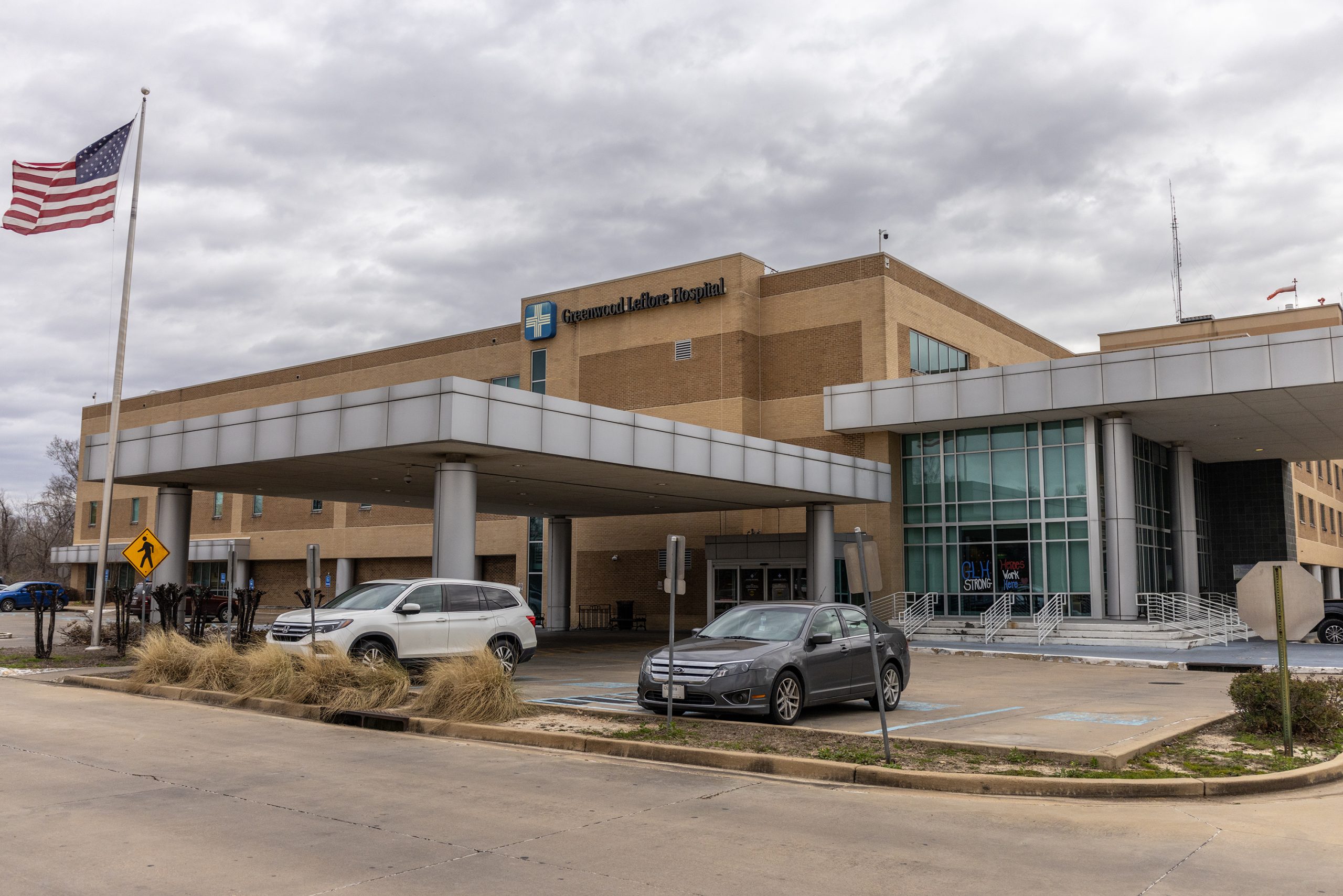Mississippi Today
Greenwood hospital, long on the financial brink, may be on its last breath

After clawing itself out of closure several months ago, Greenwood Leflore Hospital once again faces that reality after being denied money from the county.
The hospital, one of the largest in the Mississippi Delta that has drawn national attention for its struggles over the past year, was bled dry by the pandemic. To keep its doors open, Greenwood Leflore Hospital has shut down departments, applied for grants and pursued a new federal designation aimed at bringing in more money. It’s even gone up for lease again after a potential agreement fell through last year.
Additionally, in early April, the Leflore County Board of Supervisors voted to obtain a $10 million line of credit to support the hospital. At the time, the hospital said that money would allow them to stay open until 2024.
But one by one in recent days, nearly all those backstops have crumbled.
State grant money that was previously promised has proven difficult for hospitals to get their hands on, if at all. As of August no grant money has been awarded. And last month, the regional Centers for Medicaid and Medicare Services office denied the hospital’s application to become a critical access hospital, which would allow them to be reimbursed by Medicare at a higher rate.
Though the application is still being considered on the federal level and hospital administration insists that the decision from the regional office was expected, it’s largely why the Leflore County Board of Supervisors on Wednesday voted 3-2 against the hospital’s request to draw down $1 million from that line of credit to cover hospital payroll in September.
Now, hospital administration say they have enough cash to pay employees until the end of the month. Beyond that, hospital leaders say the future is uncertain.
Interim CEO Gary Marchand said the board of supervisors’ decision came as a surprise.
“We have disclosed all our efforts to sustain hospital services and (are) trying to understand what changed the county’s thinking about the path we have all been on together,” he said.
Greenwood Mayor Carolyn McAdams was also baffled and called the move “reckless.”
“I don’t understand why they did that,” she said. “The whole point of the line of credit was for the hospital to use that money to make payroll until a long-term solution could be found.”
But Supervisor Reggie Moore, who voted against the hospital’s request, said the board is just acting on the desires of their constituents who don’t want the board to put “more money on a burning fire that leads to a tax increase.”
“What do you do when you have the Pharaoh’s army behind you and the Red Sea in front of you?” he said.
Moore said the board announced they were holding a meeting earlier this week, and they wanted to hear from the hospital board, hospital administrators and city officials to collaborate on a long-term plan before they took on additional credit. Most of those stakeholders didn’t show up, and Moore said he still hasn’t heard from any of them since Wednesday’s vote. Only Marchand, the hospital CFO and one person attended the Wednesday special meeting, Moore said.
“We want to be good stewards of taxpayer dollars,” Moore said. “I just didn’t feel comfortable with turning loose another $1.3 million on the hospital without more answers.”
The hospital has already withdrawn $5 million of the total $10 million. Moore said that the board would consider approving a new request for some of the credit in the future, but not until there’s more collaboration and strategy. He said he sees the hospital’s reliance on the critical access designation as shortsighted.
Hospital administration won’t hear if their critical access application is accepted for several months. Moore said if they’re denied, the hospital will be out of options.
Marchand previously told Mississippi Today that he was not considering suggestions of a consultant hired by the county to improve the hospital’s finances, including cutting administrative pay.
“Then there’s no healthcare, and there’s no plan,” he said. “It’s almost criminal, isn’t it? Because it is 2023, and every citizen … deserves access to good health care. We’re not a third world country, but the Delta is turning into a healthcare desert. And no one seems to be concerned.”
He cited the hospital’s small census count — which hovers between 10-20 patients at a time.
“Without critical access designation and a restructuring of the leadership, there’s a high chance the hospital closes,” Moore said.
Robert Collins, another supervisor who voted to deny the hospital’s request, cited how much money the hospital is losing each month, which Marchand confirmed was around $1 million.
“They’re steady losing a million dollars a month,” Collins said. “That’s just too much. Critical access wouldn’t even save them.”
Moore stressed that closure was not his nor the board’s intention with their vote on Wednesday. When pressed on the hospital’s importance to the community, Moore interrupted to say the hospital held personal significance for him, too — it’s where he was born and where he worked for almost a decade.
“No one cares about the hospital more than myself,” he said. “But it is my obligation and my duty to listen to constituents.”
However, despite the board’s intention, closure might be the reality the hospital now faces.
One report puts nearly half of the state’s rural hospitals at risk of closure, and when hospitals close, the effects reverberate, especially in rural communities.
Sen. David Jordan, D-Greenwood said the hospital’s closure would be “devastating.”
“This is a frightening situation to those of us who live here in this town and county,” he said. “People are already sick and dying. We’re already losing so much population, and people don’t want to move to towns where they can’t get health services. It’s going to be just a total tragedy to our community.”
In a memo to staff on Thursday, Marchand said the hospital was “assessing its legal options” and still awaiting final decision from CMS on its critical access application.
By the time they hear the final decision, it’s not certain that the hospital will still be open.
When pressed on Thursday about the likelihood of the hospital’s closure, Collins conceded it was a possibility. He said he hopes the hospital comes up with a plan, but he couldn’t offer any suggestions beyond that.
Collins cut the phone interview short, saying he was on the golf course and in the middle of a swing.
This article first appeared on Mississippi Today and is republished here under a Creative Commons license.
Did you miss our previous article…
https://www.biloxinewsevents.com/?p=287865
Mississippi Today
Hospitals see danger in Medicaid spending cuts
Mississippi hospitals could lose up to $1 billion over the next decade under the sweeping, multitrillion-dollar tax and policy bill President Donald Trump signed into law last week, according to leaders at the Mississippi Hospital Association.
The leaders say the cuts could force some already-struggling rural hospitals to reduce services or close their doors.
The law includes the largest reduction in federal health and social safety net programs in history. It passed 218-214, with all Democrats voting against the measure and all but five Republicans voting for it.
In the short term, these cuts will make health care less accessible to poor Mississippians by making the eligibility requirements for Medicaid insurance stiffer, likely increasing people’s medical debt.
In the long run, the cuts could lead to worsening chronic health conditions such as diabetes and obesity for which Mississippi already leads the nation, and making private insurance more expensive for many people, experts say.
“We’ve got about a billion dollars that are potentially hanging in the balance over the next 10 years,” Mississippi Hospital Association President Richard Roberson said Wednesday during a panel discussion at his organization’s headquarters.
“If folks were being honest, the entire system depends on those rural hospitals,” he said.
Mississippi’s uninsured population could increase by 160,000 people as a combined result of the new law and the expiration of Biden-era enhanced subsidies that made marketplace insurance affordable – and which Trump is not expected to renew – according to KFF, a health policy research group.
That could make things even worse for those who are left on the marketplace plans.
“Younger, healthier people are going to leave the risk pool, and that’s going to mean it’s more expensive to insure the patients that remain,” said Lucy Dagneau, senior director of state and local campaigns at the American Cancer Society.
Among the biggest changes facing Medicaid-eligible patients are stiffer eligibility requirements, including proof of work. The new law requires able-bodied adults ages 19 to 64 to work, do community service or attend an educational program at least 80 hours a month to qualify for, or keep, Medicaid coverage and federal food aid.
Opponents say qualified recipients could be stripped of benefits if they lose a job or fail to complete paperwork attesting to their time commitment.
Georgia became the case study for work requirements with a program called Pathways to Coverage, which was touted as a conservative alternative to Medicaid expansion.
Ironically, the 54-year-old mechanic chosen by Georgia Gov. Brian Kemp to be the face of the program got so fed up with the work requirements he went from praising the program on television to saying “I’m done with it” after his benefits were allegedly cancelled twice due to red tape.
Roberson sent several letters to Mississippi’s congressional members in weeks leading up to the final vote on the sweeping federal legislation, sounding the alarm on what it would mean for hospitals and patients.
Among Roberson’s chief concerns is a change in the mechanism called state directed payments, which allows states to beef up Medicaid reimbursement rates – typically the lowest among insurance payors. The new law will reduce those enhanced rates to nearly as low as the Medicare rate, costing the state at least $500 million and putting rural hospitals in a bind, Roberson told Mississippi Today.
That change will happen over 10 years starting in 2028. That, in conjunction with the new law’s one-time payment program called the Rural Health Care Fund, means if the next few years look normal, it doesn’t mean Mississippi is safe, stakeholders warn.
“We’re going to have a sort of deceiving situation in Mississippi where we look a little flush with cash with the rural fund and the state directed payments in 2027 and 2028, and then all of a sudden our state directed payments start going down and that fund ends and then we’re going to start dipping,” said Leah Rupp Smith, vice president for policy and advocacy at the Mississippi Hospital Association.

Even with that buffer time, immediate changes are on the horizon for health care in Mississippi because of fear and uncertainty around ever-changing rules.
“Hospitals can’t budget when we have these one-off programs that start and stop and the rules change – and there’s a cost to administering a program like this,” Smith said.
Since hospitals are major employers – and they also provide a sense of safety for incoming businesses – their closure, especially in rural areas, affects not just patients but local economies and communities.
U.S. Rep. Bennie Thompson is the only Democrat in Mississippi’s congressional delegation. He voted against the bill, while the state’s two Republican senators and three Republican House members voted for it. Thompson said in a statement that the new law does not bode well for the Delta, one of the poorest regions in the U.S.
“For my district, this means closed hospitals, nursing homes, families struggling to afford groceries, and educational opportunities deferred,” Thompson said. “Republicans’ priorities are very simple: tax cuts for (the) wealthy and nothing for the people who make this country work.”
While still colloquially referred to as the One Big Beautiful Bill Act, the name was changed by Democrats invoking a maneuver that has been used by lawmakers in both chambers to oppose a bill on principle.
“Democrats are forcing Republicans to delete their farcical bill name,” Senate Democratic Leader Charles Schumer of New York said in a statement. “Nothing about this bill is beautiful — it’s a betrayal to American families and it’s undeserving of such a stupid name.”
The law is expected to add at least $3.3 trillion to the nation’s debt over the next 10 years, according to the most recent estimate from the Congressional Budget Office.
This article first appeared on Mississippi Today and is republished here under a Creative Commons Attribution-NoDerivatives 4.0 International License.
The post Hospitals see danger in Medicaid spending cuts appeared first on mississippitoday.org
Note: The following A.I. based commentary is not part of the original article, reproduced above, but is offered in the hopes that it will promote greater media literacy and critical thinking, by making any potential bias more visible to the reader –Staff Editor.
Political Bias Rating: Center-Left
This article reports on the negative impacts of a major federal tax and policy bill on Medicaid funding and rural hospitals in Mississippi. While it presents factual details and statements from stakeholders, the tone and framing emphasize the harmful consequences for vulnerable populations and health care access, aligning with concerns typically raised by center-left perspectives. The article highlights opposition by Democrats and critiques the bill’s priorities, particularly its effect on poor and rural communities, suggesting sympathy toward social safety net preservation. However, it maintains mostly factual reporting without overt partisan language, resulting in a moderate center-left bias.
Crooked Letter Sports Podcast
Podcast: The Mississippi Sports Hall of Fame Class of ’25
The MSHOF will induct eight new members on Aug 2. Rick Cleveland has covered them all and he and son Tyler talk about what makes them all special.
Stream all episodes here.
This article first appeared on Mississippi Today and is republished here under a Creative Commons Attribution-NoDerivatives 4.0 International License.
The post Podcast: The Mississippi Sports Hall of Fame Class of '25 appeared first on mississippitoday.org
Mississippi Today
‘You’re not going to be able to do that anymore’: Jackson police chief visits food kitchen to discuss new public sleeping, panhandling laws
Diners turned watchful eyes to the stage as Jackson Police Chief Joseph Wade took to the podium. He visited Stewpot Community Services during its daily free lunch hour Thursday to discuss new state laws, which took effect two days earlier, targeting Mississippians experiencing homelessness.
“I understand that you are going through some hard times right now. That’s why I’m here,” Wade said to the crowd. “I felt it was important to come out here and speak with you directly.”
Wade laid out the three bills that passed earlier this year: House Bill 1197, the “Safe Solicitation Act,” HB 1200, the “Real Property Owners Protection Act” and HB 1203, a bill that prohibits camping on public property.
“Sleeping and laying in public places, you’re not going to be able to do that anymore,” he said. “There’s a law that has been passed that you can’t just set up encampments on public or private properties where it’s a public nuisance, it’s a problem.”
The “Real Property Owners Protection Act,” authored by Rep. Brent Powell, R-Brandon, is a bill that expedites the process of removing squatters. The “Safe Solicitation Act,” authored by Rep. Shanda Yates, I-Jackson, requires a permit for panhandling and allows people to be charged with a misdemeanor if they violate this law. The offense is punishable by a fine not to exceed $300 and an offender could face up to six months in jail. Wade said he’s currently working with his legal department to determine the best strategy for creating and issuing permits.
“We’re going to navigate these legal challenges, get some interpretations, not only from our legal department, but the Attorney General’s office to ensure that we are doing it legally and lawfully, because I understand that these are citizens,” he said. “I understand that they deserve to be treated with respect, and I understand that we are going to do this without violating their constitutional rights.”
Wade said the Jackson Police Department is steadily fielding reports of squatters in abandoned properties and the law change gives officers new power to remove them more quickly. The added challenge? Figuring out what to do with a person’s belongings.
“These people are carrying around what they own, but we are not a repository for all of their stuff,” he said. “So, when we make that arrest, we’ve got to have a strategic plan as to what we do with their stuff.”
Wade said there needs to be a deeper conversation around the issues that lead someone to becoming homeless.
“A lot of people that we’re running across that are homeless are also suffering from medical conditions, mental health issues, and they’re also suffering from drug addiction and substance abuse. We’ve got to have a strategic approach, but we also can’t log jam our jail down in Raymond,” Wade said.
He estimates that more than 800 people are currently incarcerated at the Raymond Detention Center, and any increase could strain the system as the laws continue to be enforced.
“I think there’s layers that we have to work through, there’s hurdles that we are going to overcome, but we’ve got to make sure that we do it and make sure that my team and JPD is consistent in how we enforce these laws,” Wade said.
Diners applauded Wade after he spoke, in between bites of fried chicken, salad, corn and 4th of July-themed packaged cakes. Wade offered to answer questions, but no one asked any.
Rev. Jill Buckley, executive director of Stewpot, said that the legislation is a good tool to address issues around homelessness and community needs. She doesn’t want to see people who are homeless be criminalized, but she also wants communities to be safe.
“I support people’s right to self determine, and we can’t impose our choices on other people, but there are some cases in which that impinges on community safety, and so to the extent that anyone who is camping or panhandling or squatting and is a danger to themselves and others, of course, I fully support that kind of law. I don’t support homelessness being criminalized as such,” Buckley said.

Many of the people Wade addressed while they ate Thursday said they have housing, don’t panhandle, and shouldn’t be directly impacted by the legislation. But Marcus Willis, 42, said it would make more sense if elected officials wanted to combat the negative impacts of homelessness that they help more people secure employment.
“There ain’t enough jobs,” said Willis, who was having lunch with his girlfriend Amber Ivy.
The two live in an apartment together nearby on Capitol Street, where Ivy landed after her mother, whom Ivy had been living with, suffered a stroke and lost the property. Similarly, Willis started coming to eat at Stewpot after his grandmother, whose house he used to visit for lunch, passed away.
Willis holds odd jobs – cutting grass, home and auto repair – so the income is inconsistent, and every opportunity for stable employment he said he’s found is outside of Jackson in the suburbs. The couple doesn’t have a car.
Making rent every month usually depends on their ability to find someone to help chip in, said Ivy, who is in recovery from substance abuse. She said she’s watched problems surrounding homelessness grow over the years in Jackson. Ivy grew up near Stewpot and has lived in various neighborhoods across the city – except for the times she moved out of state when things got too rough.
“There was just moments where I just had to leave,” Ivy said. “Sometimes if you hit a slump here, there’s almost no way for you to get out of it.”
This article first appeared on Mississippi Today and is republished here under a Creative Commons Attribution-NoDerivatives 4.0 International License.
The post 'You're not going to be able to do that anymore': Jackson police chief visits food kitchen to discuss new public sleeping, panhandling laws appeared first on mississippitoday.org
Note: The following A.I. based commentary is not part of the original article, reproduced above, but is offered in the hopes that it will promote greater media literacy and critical thinking, by making any potential bias more visible to the reader –Staff Editor.
Political Bias Rating: Center-Right
This article primarily reports on new laws in Jackson, Mississippi, targeting public sleeping, panhandling, and squatting, focusing on statements by Police Chief Joseph Wade and community perspectives. The coverage presents the legislative measures—authored by Republican and independent lawmakers—with a tone that emphasizes law enforcement challenges and community safety, reflecting a conservative approach to homelessness as a public order issue. While it includes voices concerned about criminalization and the need for social support, the overall framing centers on law enforcement and property protection. The article maintains factual reporting without overt editorializing but leans slightly toward a center-right perspective by highlighting legal enforcement as a solution.
-
News from the South - Georgia News Feed7 days ago
'Big Beautiful Bill' already felt at Georgia state parks | FOX 5 News
-
The Center Square7 days ago
Alcohol limits at odds in upcoming dietary guidelines | National
-
The Center Square5 days ago
Here are the violent criminals Judge Murphy tried to block from deportation | Massachusetts
-
News from the South - Kentucky News Feed5 days ago
Woman arrested in Morgantown McDonald’s parking lot
-
News from the South - Texas News Feed6 days ago
Hill Country flooding: Here’s how to give and receive help
-
News from the South - North Carolina News Feed6 days ago
Raleigh caps Independence Day with fireworks show outside Lenovo Center
-
News from the South - Missouri News Feed7 days ago
Shannon County Sheriff alleges ‘orchestrated campaign of harassment and smear tactics,’ threats to life
-
Our Mississippi Home7 days ago
The Other Passionflower | Our Mississippi Home


















































